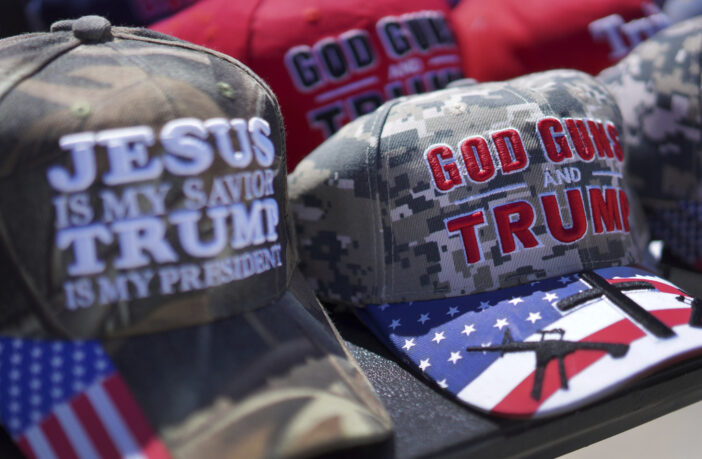By Rev. Dorothy S. Boulware
Word in Black
Overview:
In “Our Confession of Evangelical Conviction,” faith leaders are attempting to roll back the growing link between fundamentalist Christianity and conservative dogma.
In a step unlike any in recent memory, a group of evangelical Christian leaders has issued a confessional document urging the faithful to separate religion and politics, warning against “political idolatry and its messengers” and rejecting “the false idols of power, wealth, and strength rather than the true God.”
Signed by an array of influential pastors and faith leaders, the statement titled “Our Confession of Evangelical Conviction” seems designed to extract their brand of Christianity from conservative politics and left-vs.-right culture wars. It also is framed as a reminder to avoid blurring the lines between the church’s core values and political dogma — or any candidates.
Hats reading, “God, Guns and Trump,” and “Jesus is my savior, Trump is my president,” are sold at a campaign rally for former president Donald Trump in Vandalia, Ohio. Trump continues to draw strong support from evangelicals and other conservative Christians. Now worried about the damage done to their faith, leaders of the evangelical Christian church issued a confessional document warning against conflating religion and politics. (AP Photo/Jessie Wardarski)
“We reject the false teaching that anyone other than Jesus Christ has been anointed by God as our Savior, or that a Christian’s loyalty should belong to any political party,” according to the statement.
In announcing the document with other leaders on Sept. 9, Pastor Raymond Chang, president of the Asian American Christian Collaborative, said the confessional is intended to address the “deep political syncretism that has long taken hold of the evangelical church in the U.S.”
That school of thought “has conflated partisan politics with evangelical Christianity,” he said. “It’s time to recalibrate and unite in our shared commitment to Jesus beyond the divisions of politics.”
Though it speaks in generalities, the document seems aimed at politicians in general, conservative politicians specifically — and Donald Trump, the Republican Party’s 2024 presidential nominee, in particular.
The former president is wildly popular among evangelical Christians, despite a public record that includes three marriages, two impeachments, the Jan. 6 attempt to overthrow the 2020 election, a multimillion-dollar civil judgment against him for rape and a criminal conviction linked to paying hush money to an adult film star.
Though Trump is not a regular churchgoer, a majority of conservative voters chose him at the ballot box, and an astonishing 80 percent of them voted for him in 2020. Some pastors and conservative politicians have even referred to the former president as ”God’s imperfect messenger” or “the chosen one”— a viewpoint that accelerated after Trump survived an alleged assassination attempt while campaigning in July.
For his part, Trump has clearly returned the love. Speaking to a convention of evangelicals in July, the former president promised that if he was re-elected, “you won’t have to vote again, my beautiful Christians.”
“Christians get out and vote. Just this time,” he said. “You won’t have to do it anymore.”
The leaders who announced the confessional represent thousands of churches and more than 4 million evangelical Christians. They also announced a commitment to worship and pray together for the week Sept. 8-15.
The tenets of the “Confession of Evangelical Conviction” are to give allegiance to Jesus Christ alone; to lead with love, not fear; to submit to the truth of the Scripture; to believe the Gospel heals every worldly division; to commit to the prophetic mission of the church; to value every person as created in God’s image; and to recognize Godly leaders by their character..
Dr. Christina Edmondson, co-founder of Truth’s Table, one of the many partner groups, said the statement of faith helps address her concern about Generation Z “because they are concerned about us. They don’t recognize the church that raised them.”
Evangelical Christians are defined as believers who “take the Bible seriously and believe in Jesus Christ as savior and Lord.” The term “evangelical” comes from the Greek word “euangelion,” which means the good news or the gospel. Thus, the evangelical faith focuses on the good news of salvation brought to sinners by Jesus Christ, according to the National Association of Evangelicals.
“In a political realm filled with fear, we have an opportunity as Evangelicals to lead through love rather than fear,” said Karen Swallow Prior, an evangelical Christian author, professor and speaker. “I’m excited about this statement and the vision it casts, cutting across partisan lines to show the world what the church truly is.”
Skye Jethani, author, speaker, and co-host of “The Holy Post” podcast, agrees: “The Confession is designed to hold up a mirror to those who read it. We believe in a God who raises people from the dead, and we certainly believe that God can free Evangelicals from their captivity to political idolatry.”
”Through this revival, we are calling on the church to turn away from fear and divisions and place our faith solely in Jesus Christ,” said Dr. Dan Boom, president of Trevecca Nazarene University and board chair for the Council for Christian Colleges and Universities.
This article was originally published on WordinBlack.com.



